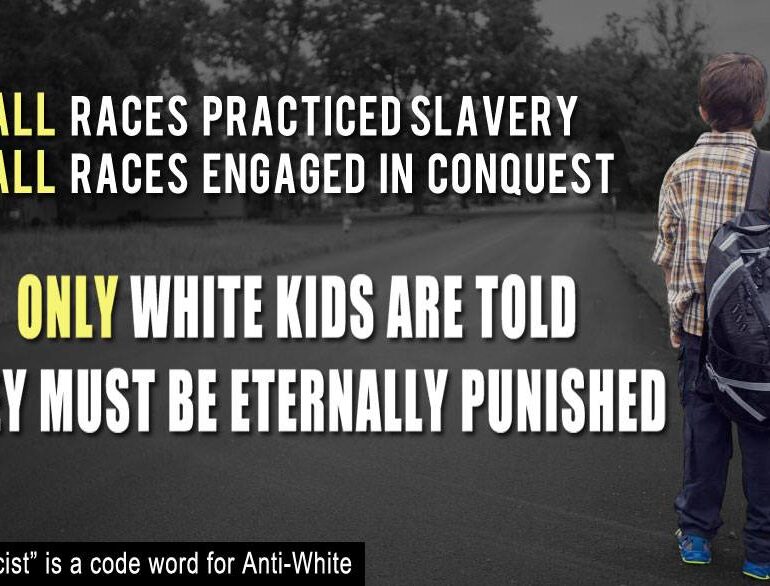
The Progressive Campaign to Keep White Americans Hating Themselves
Until America regains its moral compass, realizes hate is not an argument, and white Americans stop accepting the supposed evils of their whiteness, we will all continue to be stuck in our wounds.
Cultures, like people, have a sense of life, which Ayn Rand once characterized as, “an emotional atmosphere created by its dominant philosophy, by its view of man and of existence,” that “represents a culture’s dominant values and serves as a leitmotif of a given age.”
Today, we live in an age of hatred—not only for America, its founders, its documents, and its history, but also for what Progressives contend are the common denominators in those iniquities: white Americans and their very “whiteness.”
Despite more than 60 years of transformative racial reconciliation and redress, the far-Left seeks to change America’s understanding of itself by inflaming racial animus and rolling out a cornucopia of holy causes dressed up as history. From invisible and immeasurable memes of systemic and institutional racism to glib, bumper sticker tropes of white supremacy and white privilege to specious postulations of white fragility, critical race theory, even climate racism—these obsessive hatreds seek to undo civil society as we know it.
To this end, Ibram X. Kendi, author of How to be an Antiracist and director of Boston University’s Center for Antiracist Research, openly asserts, “The only remedy to past discrimination is present discrimination. The only remedy to present discrimination is future discrimination.”
More troubling than Kendi’s radical-chic activism, weighing in at $20,000 per hour for virtual presentations, is the Progressive movement’s most unexpected ally—white Americans hating themselves and other white Americans precisely for being white.
Consider Robert Jensen, author of The Heart of Whiteness: Confronting Race, Racism and White Privilege and an early proponent and practitioner of white self-loathing: “So, I hate myself, which is appropriate. . . . We should hate whiteness and be accountable for our own complicity with whiteness. . . . Whiteness is depraved and degraded. To accept whiteness . . . is to deform oneself.” Accordingly, to Jensen, white America must face the inescapable conclusion: “Whiteness—the whole constellation of practices, beliefs, attitudes, emotions that are mixed up with being white—is the problem. . . . The real White People’s Burden is to civilize ourselves.”
HBO comedian Bill Maher sees the phenomenon from a different perspective: “Lifting up those who society has cheated or forsaken, that’s liberalism. Hating all things white is just tedious virtue signaling.” Maher’s solution is a purely capitalist one—if white progressives “really feel this bad about the whole race thing . . . let’s tax whiteness. . . . We’ll do it like carbon offsets. We’ll calculate your exact level of white blameness [sic],” and “come up with just the right dollar figure to offset the exact amount of you being a f—ing loser.”
As for guilt-ridden white suburban housewives and Hollywood celebrities such as Rosanna Arquette—“I’m sorry I was born white and privileged. It disgusts me and I feel so much shame.”—Maher opines, “Do you think it’s hard being a black man in a white man’s world? Try being a white woman who feels bad about you being a black man in a white man’s world.”
Similarly, BET founder Robert Johnson says whites who tear down statues, cancel TV shows, and fire unwoke professors “have the mistaken assumption that black people are sitting around cheering for them saying, ‘Oh, my God, look at these white people—they’re doing something so important to us.’” In reality, Johnson says, “black people laugh at white people who do this. . . .” And “the notion that a celebrity could get on a Twitter feed and say, ‘Oh, my God, I’m so sorry that I’m white’—that, to me, is the silliest expression of white privilege that exists in this country,” the thought being, “I gotta do something for the Negroes to make them feel better. . . . It’s tantamount to rearranging the deck chairs on a racial Titanic. It absolutely means nothing.”
Ultimately, to hate oneself and to align that hate with a divisive and often violent racial movement is a powerful and dangerous unifying agent. It lures those harboring fanatical grievance away from themselves and offers them a commonality of meaning and purpose—to a cause and to their lives. Today’s progressive crusade has exploited these hatreds to form alliances, kinships, and consensuses—not only with like-minded people, but also a compliant media, corporations, and academia—all in the hope of shepherding forth a social and racial revolution deemed inevitable and necessary for some ill-defined “restorative justice.” One can only wonder about the fate of dissidents and “oppressors” inside their new American Marxist utopia.
Consequently, Americans of all stripes feel our society is unraveling before our eyes because we have lost our common culture and our common values. E pluribus unum is little more than an anachronistic slogan—a vestige of a dark time that belongs on the scrap heap of history like so many toppled statues of our now-disgraced forebears.
Until America regains its moral compass, realizes hate is not an argument, and white Americans stop accepting the supposed evils of their whiteness, we will all continue to be stuck in our wounds.